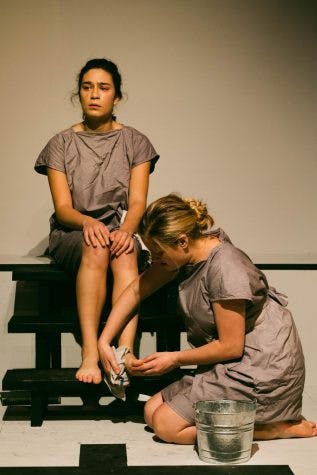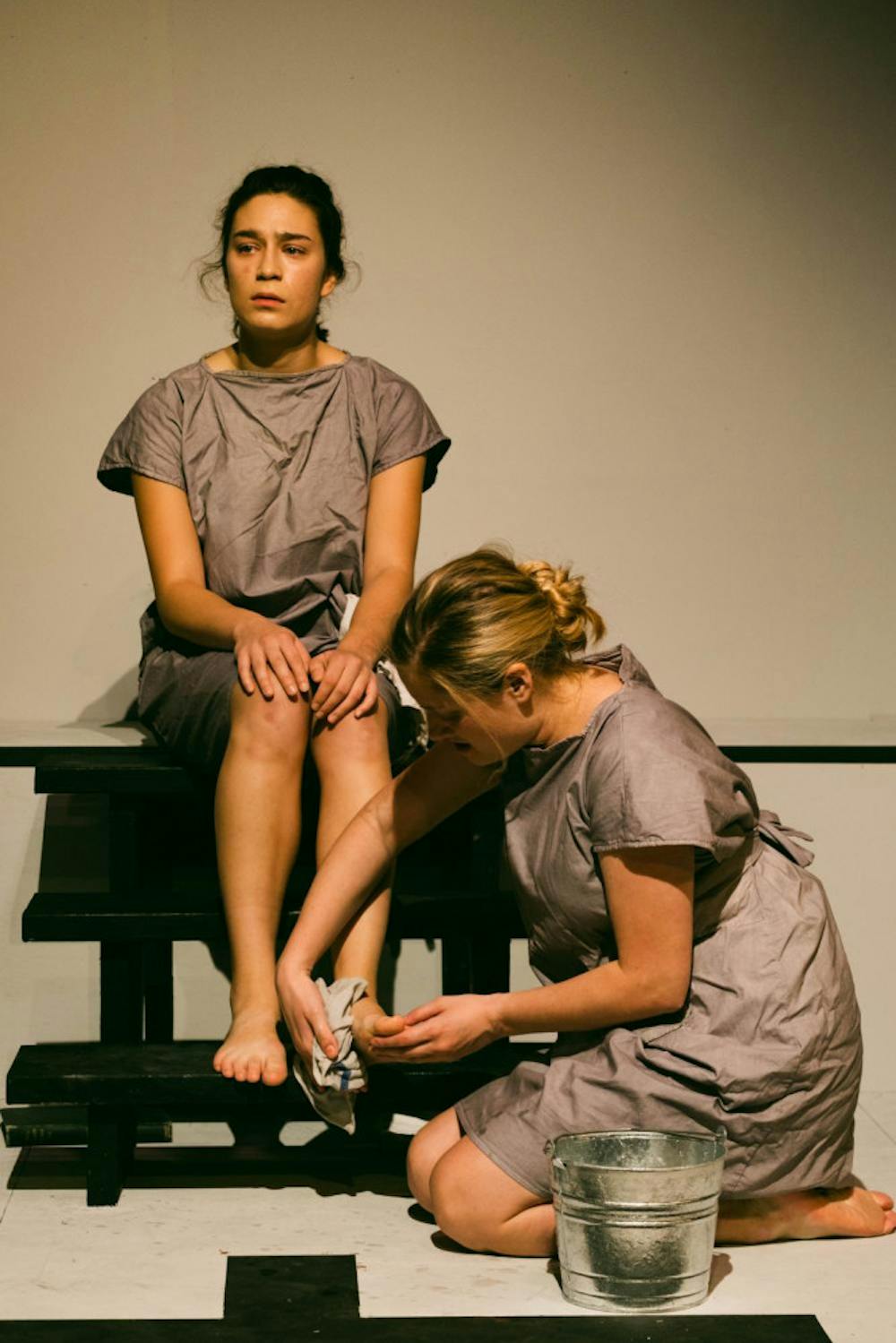After his conviction for “sodomy and gross indecency,” Irish playwright Oscar Wilde (1854–1900) served two years in Reading Gaol prison. Following his release, he lived in exile, wandering the streets of Paris drunk, broke and alone. None of these hardships, however, made Wilde any less funny. “My wallpaper and I are fighting a duel to the death,” the playwright allegedly remarked on his deathbed. “One or the other of us has to go.”
The dark comedy in “Airswimming” (1997) has echoes of Wilde. Dorphea and Persephone, the play’s protagonists, get locked up in a mental ward for deviating from the sexual norms of early 20th-century Britain. Like Wilde, they both see the funny side of their harsh lot: Throughout the play, the two women chortle about topics ranging from Doris Day’s virginity to Joan of Arc’s burning. “Airswimming” — which played at the Hepburn Zoo from Thursday, Nov. 14 to Saturday, Nov. 16 — was masterfully directed by Zachary Varricchione ’21. The play starred Madeline Ciocci ’20 and Gabby Valdivieso ’20 as Dora and Persephone, respectively. The production was also Ciocci’s senior thesis acting project for her theater major.
Gutsy musical numbers, raw performances and clever staging turned a moderately fine script into a fun evening at the theater. Anyone over the age of 12 can direct a half-decent production of a masterpiece like “Macbeth.” Good directors like Varricchione, however, can make plays from the “Troilus and Cressida” league seem like varsity material. I’m definitely excited to see more productions from Varrichione, who is a junior theater major.

“This was actually the first show I’ve ever directed, so I was met with a lot of challenges that were mostly personal,” Varricchione said. “I think the biggest challenge was creating the characters of Porph and Dorph. They are still Persephone and Dora but they are living and coping with the trauma they’ve endured.”
The show’s exploration of sexism was brutally honest. “[Getting locked up in a mental hospital] was a reality for so many women all over the U.S. and the U.K. for a really long time,” Ciocci said. “The play is actually based on a true story about three women who were all put in a mental hospital in Ireland for 50 years for having children without being married.”
“Airswimming” begins in 1924. Dora’s been in the insane asylum for two years, locked up for partaking in unwomanly things (namely, cigar smoking). Persephone’s the new inmate in the ward. Initially upper-crust and stiff, Persephone helps Dora’s straightjacket years become more endurable with a decades-long friendship. When asked about the protagonists’ relationship, Varricchione suggested that their friendship has an element of self-preservation. “I would say it’s a story about survival through friendship,” Varricchione said. “The love between [Persephone and Dora] is very genuine in my eyes. They are what they have to live for.”
The reparté between Ciocci and Valdivieso was notably sharp. “Gabby and I were actually freshman year roommates, so we had a great jumping off point to go from,” Ciocci said. Since the play only features two characters, the connection between the two actors was essential. “It’s a totally unique and awesome feeling to be working on the same mental wavelength as another person,” Ciocci said. “In shows like this, unless you can get to that level of mental symbiosis, the show doesn’t work…Gabby and I have worked really hard to develop that parallel.”
[pullquote speaker="Madeline Ciocci '20" photo="" align="center" background="on" border="all" shadow="on"]The only thing that gets these women through this horrific experience is their relationship.[/pullquote]
The play’s musical numbers, set to jazz hits by the singer Doris Day, also highlighted the two students’ impeccable dance moves. The two actresses made washing tubs and sweeping tiles look like something out of “Singin’ In The Rain” (1952). But despite Varricchione’s use of Great American Songbook standards like “Bewitched, Bothered and Bewildered,” the production was a far cry from a Rodgers and Hart musical comedy. “In musicals, there’s often specific choreography and movement for the songs,” said Ciocci, who sings several songs in the play. “Whereas in [‘Airswimming’], every time I sing each song, I do it differently and do movement that feels right in that moment for that specific performance.”
Ciocci and Valdivieso pulled off impressively convincing English accents. Each actress did a good job at distinguishing the social class of their character through dialect choices. Valdivieso’s Dora had a subtle Cockney accent, while Ciocci’s Persephone sounded like she had just wandered off the set of “The Crown.” “I was definitely not the dialect coach,” said Varricchione. “Thankfully, the department had dialect tapes that I was able to distribute to the two of them.”
Tech director Cooper Kelley ’22 made a set that channeled dread. On stage there was only a bathtub, a ladder and some steps. Outside the Hepburn Zoo, small paper notes marked important events in 20th century Britain. One of these placards marked the premier of “Waiting for Godot (1953),” a production that Varricchione paid homage to by using a minimal set.
But the main takeaway from this weekend’s production of “Airswimming” was gloom. Dora and Persephone eventually get happy endings, but Ciocci’s thesis project never lost sight of its main focus, exploring the cruelty that men have inflicted upon women throughout human history. “To me, the play is about what we have to do to survive in dire circumstances,” Ciocci said. “The only thing that gets these women through this horrific experience is their relationship.”
I walked out of the Hepburn Zoo thinking of a sad line from James Joyce’s “Ulysses” (1922): “History is a nightmare from which I am trying to awake.”
'Airswimming': Survival through friendship

SHIRLEY MAO/THE MIDDLEBURY CAMPUS
Comments



